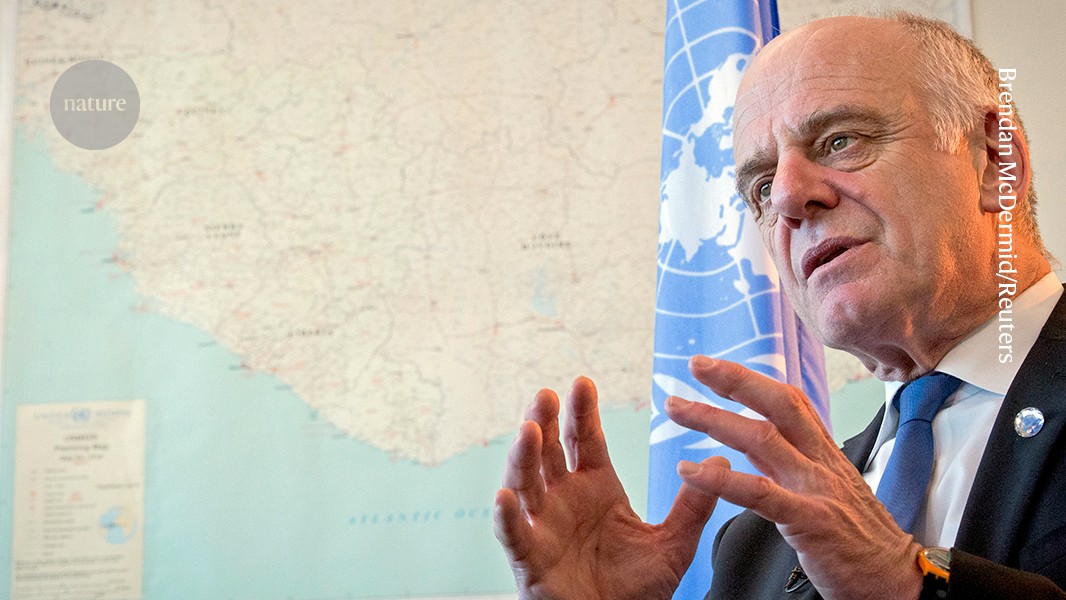David Nabarro obituary: global-health leader who fought malnutrition, malaria, Ebola and COVID-19

Persuasive physician who brought research evidence to the heart of global policy decisions

Credit: Brendan McDermid/Reuters
Physician and international-health strategist David Nabarro, whose career included posts at the UK Department for International Development (DFID), the World Health Organization (WHO) and the United Nations, played a central part in tackling some of the world’s most pressing health crises — from malnutrition and malaria to Ebola and COVID-19. He died on 25 July at his home in Ferney-Voltaire, France.
Nabarro studied nutrition at the London School of Hygiene & Tropical Medicine (LSHTM), which shaped his multidisciplinary approach to sustainable development. It later inspired the creation of his 4SD Foundation (skills, systems and synergies for sustainable development), which focuses on nutrition and building climate-change resilience, and is based in Geneva, Switzerland. In 2018, he was co-recipient of the World Food Prize for his work against malnutrition.
Nabarro was known for his ability to take robust research evidence and translate it into practical strategies for improving the health of the world’s poorest and most vulnerable. He excelled at synthesizing complex data for senior policymakers and politicians. As the director for human development at DFID in the 1990s, he developed strong relationships with ministers from both major UK political parties: the Conservative’s Lynda Chalker and Labour’s Clare Short.
One of his most notable early achievements at the DFID was persuading Short to allocate around £50 million (US$83 million) to the WHO for the creation of Roll Back Malaria — a pioneering global partnership aimed at supporting country-led efforts to combat malaria. His time at the WHO in the early 2000s was marked by rapid advancement: he became chief of cabinet to then-director-general Gro Harlem Brundtland, working on major initiatives such as campaigns against tobacco, HIV/AIDS and tuberculosis.
Educated at Oundle School, UK, Nabarro studied medicine at the University of Oxford, UK, and University College London, qualifying in 1973. His first medical post was meant to be under an Oxford professor who was a friend of his father, the distinguished endocrinologist John Nabarro. But on the eve of starting, David sent word that he was in Kurdistan on humanitarian work and would not return for months — an early sign of his lifelong commitment to social justice and a career that would stretch far beyond the boundaries of conventional biomedicine.
At the LSHTM, his mentor in nutrition was John Waterlow, an eminent physiologist and authority on childhood malnutrition. After completing his master’s degree in nutrition, Nabarro joined the non-governmental organization Save the Children, where he led the analysis of the Kosi Hills rural development programme in eastern Nepal. He discovered that children of migrant road-construction workers had dangerously high rates of vitamin A deficiency, and he campaigned to improve both their nutrition and working conditions.
While working with Stuart McNab at the UN children’s charity UNICEF, he co-developed the McNab–Nabarro growth chart — a simple tool that allowed field workers to identify severely undernourished children using only weight measurements.
Enjoying our latest content?
Login or create an account to continue
- Access the most recent journalism from Nature's award-winning team
- Explore the latest features & opinion covering groundbreaking research
or
Sign in or create an accountNature 644, 870 (2025)
doi: https://doi.org/10.1038/d41586-025-02640-5
This story originally appeared on: Nature - Author:Anthony Costello














